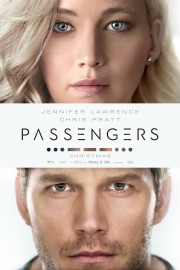Passengers
Really good science-fiction deals with the unknown in a way that takes us away from the Earth for a purpose, a specific story it wants to tell. While I greatly enjoyed it on a popcorn level, I’m not quite sure what that purpose is with Morten Tyldum’s “Passengers.” If you are a fan of either Jennifer Lawrence or Chris Pratt (or both, in my case), this is a great piece of stargazing cinema, which is to say, a movie whose primary purpose is to put two movie stars together and watch them do their thing. If you are looking for science-fiction with a purpose, it’s best to stick with “Arrival,” November’s big-idea sci-fi epic. This is a movie designed to, first and foremost, entertain its viewers, not make them think, and that is how it should be taken.
Spoilers to come. The trailers for this film are misleading, but it’s important to discuss one, particular detail.
The script, by Jon Spaihts (“Prometheus,” “Doctor Strange”), sets the stage for the viewer. We are aboard the Avalon, a commercial starship on a 120-year journey from Earth to Homestead II, a colony planet set up to house people who find Earth over-populated and too expensive. In the 30th year of the Avalon’s journey, a meteor shower sends one meteor into the hull of the ship, causing significant malfunctions that include a hibernation pod opening. That pod belongs to Jim (Chris Pratt), an engineer who is alarmed to find himself the only person awake; the crew was to wake up five months before arrival, and the passengers four. Thankfully, Jim has company in a bartending android (Arthur, played delightfully by Michael Sheen), but dying with only an android to talk to is hardly living. While walking in the Hibernation Bay, he sees Aurora Lane (Jennifer Lawrence), a New York author, and is immediately smitten. He looks her up in the databases and gets to know her- it’s love at first sight. Could he dare wake her up for the sake of companionship? If you’ve seen the trailers, you already know the answer. The moral dilemma Jim feels in waking up Aurora leads to considerable tension between the characters as they engage in a romance, but narratively, the continued after effects of the meteor shower that woke Jim up are a bigger issue for them still.
The promise of dubious moral choices, and the effects they have, will lure you in during the middle act of the film, but the truth is, this is still a contemporary sci-fi movie, and that means (typically) thrills and suspense over intellectual stimulation. The film’s director, Tyldum, is well-suited for this material, and with cinematographer Rodrigo Prieto and the visual effects artists creates some beautiful images, especially during a moment when the ship’s gravitational locks are disengaged, but I’m curious as to why the Oscar-nominated director of 2014’s “The Imitation Game” went in this route after that critical success. There’s not really a connective tissue between the films either narratively or visually, and the story is basically “Wall-E” starring Star Lord and Katniss Everdeen. It feels like a step down for the filmmaker, but if he was looking to shore up some clout with a potential box-office hit, I get why he did the film. Don’t expect “Interstellar” or “Gravity” or “Inception,” though; this is basically a film whose sole purpose for existing is to put two beautiful people together, and let the box-office cashiers ring. I enjoyed it on that level, because Pratt and Lawrence would have to work really hard to not be appealing, but I don’t see myself revisiting it anytime soon, either.










